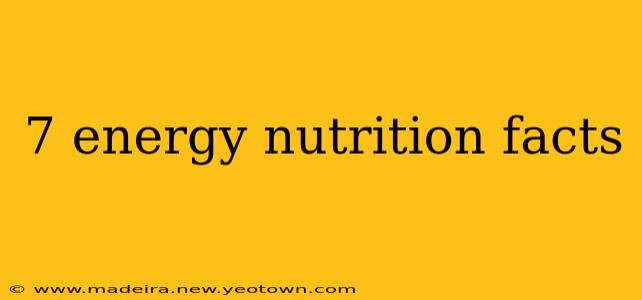7 Energy-Boosting Nutrition Facts to Fuel Your Day
We've all been there – that mid-afternoon slump, the brain fog setting in, the energy levels plummeting. Feeling sluggish isn't just uncomfortable; it can impact productivity and overall well-being. But what if I told you that the key to consistent energy lies not in sugary snacks or copious amounts of coffee, but in strategic nutrition? Let's dive into seven crucial energy nutrition facts that will revolutionize how you fuel your body and conquer that afternoon slump for good.
This isn't just another listicle; it's a journey into understanding the intricate relationship between food and energy. I'll share real-world examples, bust some common myths, and equip you with the knowledge to make informed choices about your diet. Let's begin!
1. Complex Carbohydrates are Your Steady Energy Source
Forget the quick sugar rush from refined carbs like white bread and sugary drinks. These lead to a rapid spike in blood sugar followed by a dramatic crash, leaving you feeling worse than before. Instead, focus on complex carbohydrates found in whole grains (brown rice, quinoa, oats), fruits, and vegetables. These release glucose into your bloodstream slowly and steadily, providing sustained energy throughout the day. Imagine it like this: refined carbs are like a shot of espresso – intense but fleeting. Complex carbs are more like a gentle cup of green tea – a sustained and calming energy release.
2. Protein: The Building Block of Energy and Muscle
Protein isn't just about building muscles; it's crucial for energy production. It helps regulate blood sugar levels, preventing those energy crashes. Lean protein sources like chicken breast, fish, beans, lentils, and tofu are excellent choices. Think of protein as the reliable engine of your body – providing the consistent power needed to get things done. A balanced meal with lean protein, complex carbs, and healthy fats keeps your energy levels stable and prevents mid-afternoon fatigue.
3. Healthy Fats: Not the Enemy, But a Crucial Energy Partner
Contrary to popular belief, healthy fats are essential for energy production and overall health. Unsaturated fats found in avocados, nuts, seeds, and olive oil provide sustained energy and are vital for hormone production and nutrient absorption. These fats aren't just energy providers; they're essential building blocks for various bodily functions, including brain function and cellular health. Don't shy away from healthy fats; they're an invaluable part of a balanced, energy-rich diet.
4. Iron: The Oxygen Transporter for Energy Production
Iron plays a critical role in carrying oxygen throughout your body. Without sufficient iron, your cells can't receive the oxygen they need for energy production, leading to fatigue and weakness. Good sources of iron include red meat, spinach, lentils, and fortified cereals. Iron deficiency is a common cause of fatigue, so ensuring you get enough is vital for maintaining consistent energy levels.
5. B Vitamins: The Energy Metabolism Powerhouse
B vitamins are co-factors in many metabolic processes, including energy production. A deficiency in B vitamins can lead to fatigue, weakness, and other symptoms. Good sources of B vitamins include whole grains, leafy green vegetables, meat, poultry, and eggs. Think of B vitamins as the spark plugs in your car’s engine – essential for igniting the energy production process.
6. Hydration: The Unsung Hero of Energy
Dehydration can lead to fatigue, headaches, and decreased cognitive function. Water is crucial for transporting nutrients, regulating body temperature, and maintaining optimal cellular function. Aim to drink plenty of water throughout the day. Feeling tired? Try drinking a glass of water before reaching for a sugary drink – you might be surprised at how much it improves your energy levels. It's often the simplest solutions that yield the most impactful results.
7. The Importance of Balanced Meals
The key to consistent energy isn't just about individual nutrients; it's about eating balanced meals that combine complex carbohydrates, lean protein, healthy fats, and plenty of fruits and vegetables. This ensures a steady release of glucose, prevents blood sugar crashes, and provides all the necessary nutrients for optimal energy production. Skipping meals can actually worsen fatigue, as your body needs a continuous supply of fuel to function properly.
By incorporating these seven energy nutrition facts into your daily life, you'll discover a powerful and sustainable way to boost your energy levels naturally. Remember, consistent healthy eating is more effective than relying on quick fixes. So, fuel your body right, and get ready to conquer your day!

